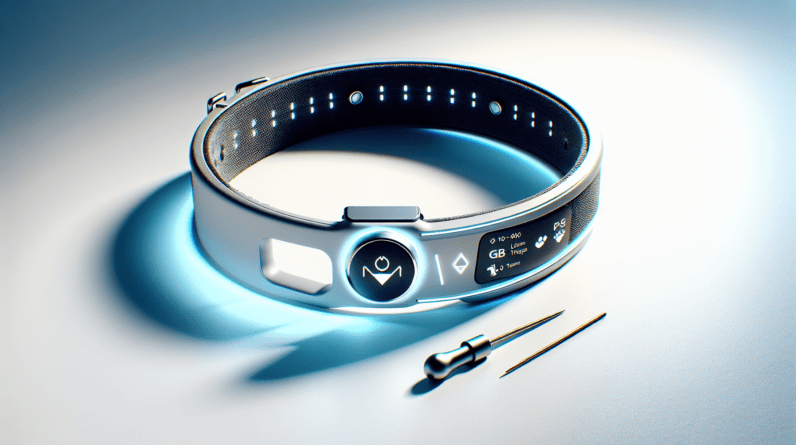
Imagine never having to worry about losing your beloved pet again. With the advancements in technology, there is a simple solution to this common concern – the microchip. The benefits of the microchip are numerous, providing peace of mind for pet owners and potentially saving countless animal lives. This tiny, secure device can be implanted under your pet’s skin, containing vital information such as your contact details. In the unfortunate event that your furry companion wanders off, the microchip can be scanned by veterinarians or animal shelters, allowing for a quick and safe return home. Discover the advantages of the microchip and how it can revolutionize the way we protect and care for our beloved pets.

Identification
Permanent identification of pets
Microchipping your pet offers a permanent form of identification that can greatly increase the chances of a lost or stolen pet being reunited with its owner. Unlike collars or tags, microchips are embedded under the skin and cannot be easily removed or lost. This means that even if your pet loses its collar or tag, the microchip will still provide a reliable way to identify them.
Ability to track lost or stolen pets
One of the key benefits of microchipping is the ability to track lost or stolen pets. Microchips contain a unique identification number that can be scanned by veterinary clinics, animal shelters, and animal control agencies. By scanning the microchip, these organizations can access the owner’s contact information and quickly reunite the pet with its family.
Quick and easy way to reunite lost pets with their owners
When a lost pet is found and taken to a veterinary clinic or animal shelter, the first thing they do is scan for a microchip. If a microchip is detected, the contact information of the owner is retrieved from a pet registry database. This enables a swift reunion between the pet and its owner, saving both parties from unnecessary stress and worry.
Reduces the number of animals in shelters
Microchipping plays a vital role in reducing the number of animals in shelters. By providing a means of identification, lost pets can be quickly and easily reunited with their owners instead of ending up in overcrowded shelters. This frees up valuable space and resources for animals in need, and ultimately helps in finding loving homes for those without one.
Safety and Security
Prevents pet theft
Microchipping acts as a deterrent for potential pet thieves. The presence of a microchip signals that the pet has a permanent and traceable identification, making it less appealing to thieves who want to sell or keep the pet for themselves. With the fear of being caught and tracked, pet theft is less likely to occur.
Acts as a deterrent for potential pet thieves
Microchipping not only helps in preventing pet theft but also acts as a deterrent. The knowledge that pets can be easily identified and their owners can be traced back discourages potential thieves from targeting microchipped pets. This added layer of security provides peace of mind for pet owners, knowing that their beloved companions are less vulnerable to theft.
Provides peace of mind for pet owners
One of the most significant benefits of microchipping is the peace of mind it offers to pet owners. Losing a pet can be a heart-wrenching experience, but with a microchip, there is a higher chance of being reunited. Knowing that you have taken the necessary precautions to ensure the safety and identification of your furry friend can alleviate worry and stress.
Helps in verifying ownership during disputes
Microchipping plays a crucial role in verifying ownership during disputes. In situations where there are disagreements over ownership of a pet, a microchip can provide concrete evidence of ownership. By scanning the microchip and accessing the owner’s information, disputes can be quickly resolved, ensuring that the pet is returned to its rightful owner.
Medical Records
Stores important medical information
Microchips not only serve as identification but also store important medical information about your pet. These chips can contain details such as veterinary records, vaccination history, allergies, and current medications. Having this information readily accessible can be invaluable during emergencies or when seeking medical treatment for your pet.
Allows for easy access to medical records in emergencies
In emergency situations, time is of the essence. Having access to your pet’s medical records can make a significant difference in the care they receive. When your pet is microchipped, veterinarians and emergency responders can quickly retrieve vital medical information, enabling them to make informed decisions and provide the best care possible.
Enables veterinarians to provide better care
The availability of complete and up-to-date medical records through microchipping enables veterinarians to provide better care for your pet. With access to your pet’s medical history, vets can make more accurate diagnoses, tailor treatment plans to individual needs, and ensure that any pre-existing conditions are appropriately taken into account.
Helps in monitoring diseases and conditions
Microchipping also aids in monitoring diseases and conditions. With medical records stored in the microchip, veterinarians can track and monitor your pet’s health over time. This is particularly useful for managing chronic conditions or following up on previous treatments. The ability to access and analyze medical data contributes to more effective disease management and early detection of potential health issues.
Licensing and Registration
Fulfills legal requirements for pet registration
Microchipping fulfills legal requirements for pet registration in many jurisdictions. Many local authorities and municipalities mandate the microchipping of pets as part of the licensing process. By adhering to these regulations and microchipping your pet, you ensure compliance with the law and avoid any potential penalties or fines.
Ensures compliance with local regulations
In addition to fulfilling licensing requirements, microchipping helps ensure compliance with other local regulations related to pet ownership. Various jurisdictions may have specific rules regarding pet identification, such as leash laws or breed-specific legislation. By microchipping your pet, you demonstrate responsible ownership and avoid any legal issues that may arise from non-compliance.
Streamlines the licensing process
Microchipping streamlines the licensing process for pet owners. With a microchip, the owner’s contact information is readily accessible, making it easier for local authorities to verify ownership and issue licenses. This reduces the administrative burden on both the owner and the licensing agencies, resulting in a more efficient and convenient process.
Reduces instances of unregistered pets
By making microchipping a widespread practice, instances of unregistered pets can be significantly reduced. Microchipped pets are more likely to be properly registered, as the process of microchipping itself often requires registration. This promotes responsible pet ownership and ensures that pet populations are accurately accounted for, leading to better management of resources and services.

Emergency Contact
Provides emergency contact information
Microchipping provides emergency contact information that is crucial during times of crisis. By having your contact details registered with a microchip database, you can be immediately notified if your pet is found in an emergency situation, such as a natural disaster or accident. This allows you to quickly take action and ensures that your pet receives the necessary care and support.
Allows for immediate notification of pet owners in emergencies
In times of emergencies, prompt communication is essential. Microchipping allows for immediate notification of pet owners when their lost or injured pets are found. This eliminates the need for lengthy searches or waiting for someone to come forward with information. With microchips, pet owners can be swiftly contacted, enabling them to make informed decisions and take appropriate action.
Facilitates quick decision-making during crisis situations
During crisis situations, time is of the essence. Microchipping facilitates quick decision-making by providing pet owners with the necessary information to act swiftly. Whether it’s deciding on evacuation plans, arranging temporary accommodations, or seeking medical assistance, having access to contact information and a reliable means of identification allows for more efficient decision-making, ensuring the well-being of both pets and their owners.
Helps in arranging proper care for pets during emergencies
Microchipping plays a crucial role in arranging proper care for pets during emergencies. By providing emergency responders or animal welfare organizations with the owner’s contact information, they can quickly reach out to coordinate rescue efforts or arrange temporary shelter for displaced pets. This ensures that pets are not left unattended or without proper care during times of crisis.
Prevention of Euthanasia
Increases the chances of finding lost pets
Microchipping significantly increases the chances of finding lost pets. When a microchipped pet is found, scanning the chip can provide instant access to the owner’s contact details. This expedites the process of reuniting lost pets with their families, minimizing the time spent in shelters or the risk of being euthanized.
Reduces the risk of euthanasia in shelters
The risk of euthanasia in shelters can be reduced through microchipping. By providing a reliable and traceable form of identification, microchips increase the likelihood of lost pets being reunited with their owners. This translates to fewer animals remaining in shelters for extended periods, ultimately decreasing the need for euthanasia due to limited space or resources.
Improves the outcome for rescued or stray animals
For rescued or stray animals, microchipping improves their overall outcome. By microchipping these animals, it becomes easier to identify and contact potential owners or find suitable forever homes. This increases the chances of successful adoption, ensuring that these animals receive the love and care they deserve.
Saves lives by enabling timely identification
Microchipping saves lives by enabling timely identification of lost or injured pets. Quick and accurate identification ensures that pets receive the necessary medical attention, are reunited with their families, or are placed in appropriate care. By avoiding unnecessary delays and providing a means of identification, microchips contribute to saving lives and preserving the well-being of pets.
Behavioral Rehabilitation
Enables rehabilitation of abused or abandoned animals
Microchipping plays a vital role in the rehabilitation of abused or abandoned animals. For such animals, their past may be unknown, making it challenging to address their needs effectively. Microchips can contain information about the animal’s history, enabling animal welfare organizations or adoptive families to provide specialized care and support in addressing their unique behavioral challenges.
Helps in addressing behavioral issues in pets
Microchipping helps in addressing behavioral issues in pets. By having access to the pet’s history and medical records, trainers and behaviorists can better understand any underlying causes contributing to behavioral problems. This enables them to develop personalized training plans and interventions to address and resolve these issues, improving the overall well-being of pets and their relationships with their owners.
Allows for personalized care based on pet history
With microchipped pets, personalized care based on their history becomes possible. Information stored in the microchip, such as previous vaccinations, medical conditions, or behavior concerns, can guide veterinarians, trainers, and caretakers in providing tailored care and treatment plans specific to the needs of each individual pet. This individualized approach can greatly enhance the overall quality of life for pets.
Supports the reintegration of pets into loving homes
Microchipping supports the reintegration of pets into loving homes by providing crucial information about their background and needs. This information can be vital for potential adopters in understanding the pet’s past experiences, behavioral traits, and any specific care requirements. By facilitating a better match between pets and adoptive families, microchipping increases the chances of successful and long-lasting adoptions.
International Travel
Ensures compliance with microchipping requirements for travel
Microchipping ensures compliance with microchipping requirements for pet travel. Many countries and airlines have specific regulations mandating microchipping for pets entering or leaving their borders. By microchipping your pet, you guarantee adherence to these requirements, eliminating potential travel complications or restrictions.
Facilitates easy identification and verification of pets at border crossings
Microchipping facilitates easy identification and verification of pets at border crossings. When entering or leaving a country, customs and border control agencies may require proof of ownership or verification of pet identity. A microchip provides a reliable method for quickly and accurately identifying pets, streamlining the border control process and ensuring a hassle-free travel experience.
Reduces the risk of pets being denied entry or quarantined
The risk of pets being denied entry or quarantined can be reduced through microchipping. By ensuring that your pet is properly microchipped, you comply with international regulations and alleviate concerns about potential health risks or identity verification. This increases the likelihood of a smooth and seamless travel experience for both you and your pet.
Streamlines the travel process for pet owners
Microchipping streamlines the travel process for pet owners. With the necessary microchip identification, the verification of ownership and compliance with travel requirements becomes more straightforward. Microchipping ensures that pet owners can navigate the necessary paperwork and procedures efficiently, allowing them to focus on enjoying their travels without unnecessary stress or delays.
Research and Statistics
Enables accurate data collection for research purposes
Microchipping enables accurate data collection for research purposes. By maintaining a comprehensive database of microchipped pets, valuable information can be gathered about pet populations, trends, and demographics. This data contributes to a better understanding of pet welfare issues, assisting researchers in developing evidence-based strategies and policies.
Contributes to the understanding of pet populations
With accurate data collection facilitated by microchipping, a deeper understanding of pet populations can be achieved. Demographic information gathered through microchip databases helps identify areas of concern or specific needs within certain populations. This understanding is crucial in tailoring outreach programs, implementing targeted interventions, and allocating resources effectively.
Improves statistical analysis of pet demographics
Microchipping improves statistical analysis of pet demographics. By providing a reliable means of identifying pets and linking them to specific owners, microchip data enhances the accuracy of statistical analysis. This includes factors such as pet ownership rates, breed prevalence, population dynamics, and other key indicators. Such analysis helps inform policies and programs aimed at promoting responsible pet ownership and animal welfare.
Aids in the development of effective animal welfare policies
Microchipping aids in the development of effective animal welfare policies. The data collected through microchipping offers valuable insights into pet populations, including patterns of ownership, stray or feral populations, and compliance with regulations. These insights can inform the development of targeted policies and interventions aimed at enhancing animal welfare, reducing overpopulation, and promoting responsible pet ownership.
Microchip Technology Advancements
Miniaturization of microchip size for easier implantation
Microchip technology has witnessed advancements in the miniaturization of chip size, making the implantation process easier. Smaller microchips not only lead to less discomfort for the animal during implantation but also allow for broader applicability in various species and sizes. The reduced chip size ensures a smooth and straightforward implantation process, benefiting both pets and veterinarians.
Improvement in chip compatibility and readability
Advances in microchip technology have resulted in improved chip compatibility and readability. This means that microchips from different manufacturers can be reliably read by scanners or readers from various brands. Enhanced compatibility and readability across different systems make it easier for veterinary clinics, animal shelters, and other relevant organizations to access and utilize microchip data effectively.
Integration with smartphone applications for easy access to pet information
Microchip technology has evolved to integrate with smartphone applications, providing pet owners with easy access to their pet’s information. With dedicated applications, owners can conveniently view and update their pet’s medical records, track vaccination schedules, receive notifications, and even connect with nearby veterinary clinics or pet-related services. This seamless integration enhances the overall convenience and management of pet care.
Development of GPS-enabled microchips for real-time tracking
The development of GPS-enabled microchips has revolutionized the way pets can be tracked and located in real-time. These advanced microchips go beyond identification, allowing pet owners to monitor their pet’s location and movements using GPS technology. GPS-enabled microchips provide an added layer of security and peace of mind, ensuring that you can quickly locate your pet if they wander or become lost.
In conclusion, microchipping offers a wide range of benefits that encompass identification, safety, medical records, licensing compliance, emergency contact, preventing euthanasia, behavioral rehabilitation, international travel, research, and technology advancements. From providing permanent identification and tracking of pets to enabling better medical care and improving statistical analysis, microchipping has become an essential tool in safeguarding the well-being of our beloved furry companions. Embracing microchipping not only promotes responsible pet ownership but also ensures the overall welfare of our pets in various aspects of their lives.







